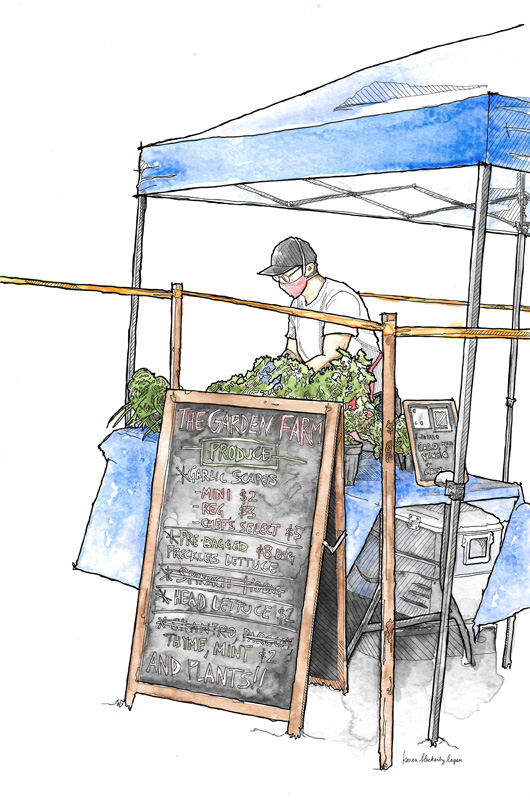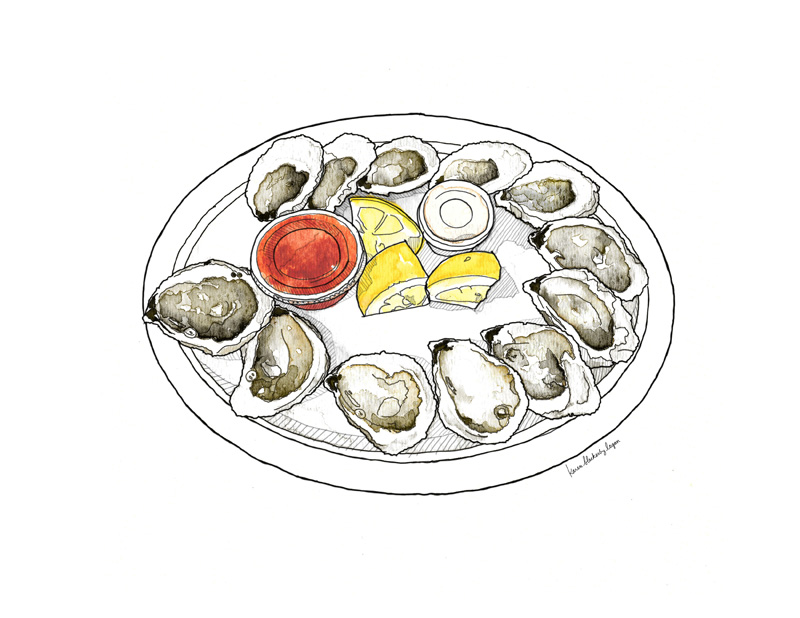
Unlike many of us, Jeremy Scheffer, owner of Spearpoint Oyster Farm, couldn’t stop working when the pandemic shut the world down this past spring. He still had cages of oysters at various stages of development in Menemsha Pond that depended on him. Shellfish don’t wait for stay-at-home orders to be lifted and they certainly don’t respond to Zoom invitations. So, even as local restaurants closed, and demand for his product dropped, Jeremy headed out on his boat each morning, tending to his bivalves and contemplating his next steps. He knew that to have a chance of keeping his business afloat, he couldn’t wait for the world to go back to “normal” — he’d have to re-imagine things in a way that made sense now.
This summer, along with a handful of other oyster farmers and fishermen, he joined the West Tisbury Farmers Market, in its new, roomier location at the Agricultural Hall. Jeremy enjoys the sense of community he feels with the other vendors. In a time when everyone is working and living more independently, it feels good to be part of a community with a shared mission, and an impressive array of Island-grown crops. But his favorite part by far is being able to interact face-to-(masked) face with his customers, something he didn’t get much of back when he used to sell 90% of his stock to restaurants. Now he has repeat customers seeking him out each week, telling him about their latest meal, asking about his growing methods, and for expert shucking advice. “People are slowing down, cooking for themselves now,” he says, “it’s so amazing to be part of that.”

Lydia Fischer, owner of the Garden Farm, has also noticed the recent back-to-basics shift on the Island. A lifelong farmer, she is a veteran of the West Tisbury Farmers Market. Lydia’s family has been farming Island soil for 13 generations, and she gets understandably sentimental when discussing the support she feels for local agriculture. This spring, at her customers’ request, she started selling seedlings to Islanders interested in starting their own gardens. “I am speechlessly grateful to get to be a part of providing food for the Island,” she says, “especially now.”
Board of health guidelines have changed more than just the location of this year’s market. In addition to requiring masks to be worn by all vendors and customers, booths are spaced far enough apart to allow for social distancing, and there is a limit to how many people are allowed in at a time. Judging by the lines waiting on Saturday mornings, Islanders and visitors alike are more than willing to wait for a chance to browse the bins of fresh meat and produce. It isn’t just because there’s less to do on the Island these days, with so many events canceled and shops and restaurants still under some restrictions — people want their food to pass through as few hands as possible on its journey from farm to table. And they want to have a relationship with the person growing it, to trust that they are taking precautions to contain the spread of the virus.
That trust goes both ways. Many farms on the Island, like the Garden Farm and Spearpoint, are one-person operations. If that person gets sick, or even exposed, they would be out of work for weeks, unable to interact with customers or crops, which would be disastrous for a small business. Not to mention the danger of the illness itself, or passing it to someone who is vulnerable to complications.
It isn’t surprising that these people who feed us were the first to adjust to the new normal. Whether their moments of quiet contemplation happen in the field or on the sea, farmers always need to watch their surroundings and adapt to circumstance—weather, market fluctuations, pestilence and, yes, even plague are familiar adversaries in the agricultural realm.
It’s comforting to know our farmers are still out there working for us, and to be part of a community that supports our local economy in a way that also protects public health. As we emerge from our homes, shedding our COVID-induced agoraphobia, we’re in no rush to get back to the hectic, pre-pandemic pace. We stroll around our newly spacious market, smelling the sunshine in our tomatoes and the briny sea in our shellfish, content in knowing we are working together to create our future, one locally grown and home cooked meal at a time.